Course Report: Effective Management in Daycare Settings (SOCW0053)
VerifiedAdded on 2023/01/17
|13
|3517
|100
Report
AI Summary
This report delves into the critical aspects of managing daycare and residential settings, emphasizing the importance of efficient management practices. It explores the characteristics of an effective manager, highlighting skills such as good communication, time management, and the ability to foster a positive work environment. The report also discusses how managers ensure workplace efficiency through goal-setting, motivation, and adaptability to change. Furthermore, it addresses the significance of equality and diversity in care settings, referencing the UK Equality Act 2010 and outlining the importance of treating all individuals with respect. The role of multidisciplinary teams and the benefits of teamwork are examined, along with strategies for achieving and maintaining standards in care homes. The report covers how to ensure equal treatment to service users, and the importance of a multidisciplinary team. Overall, the report provides a comprehensive overview of the key elements necessary for successful management in daycare and residential settings, offering insights into creating a supportive and effective care environment.
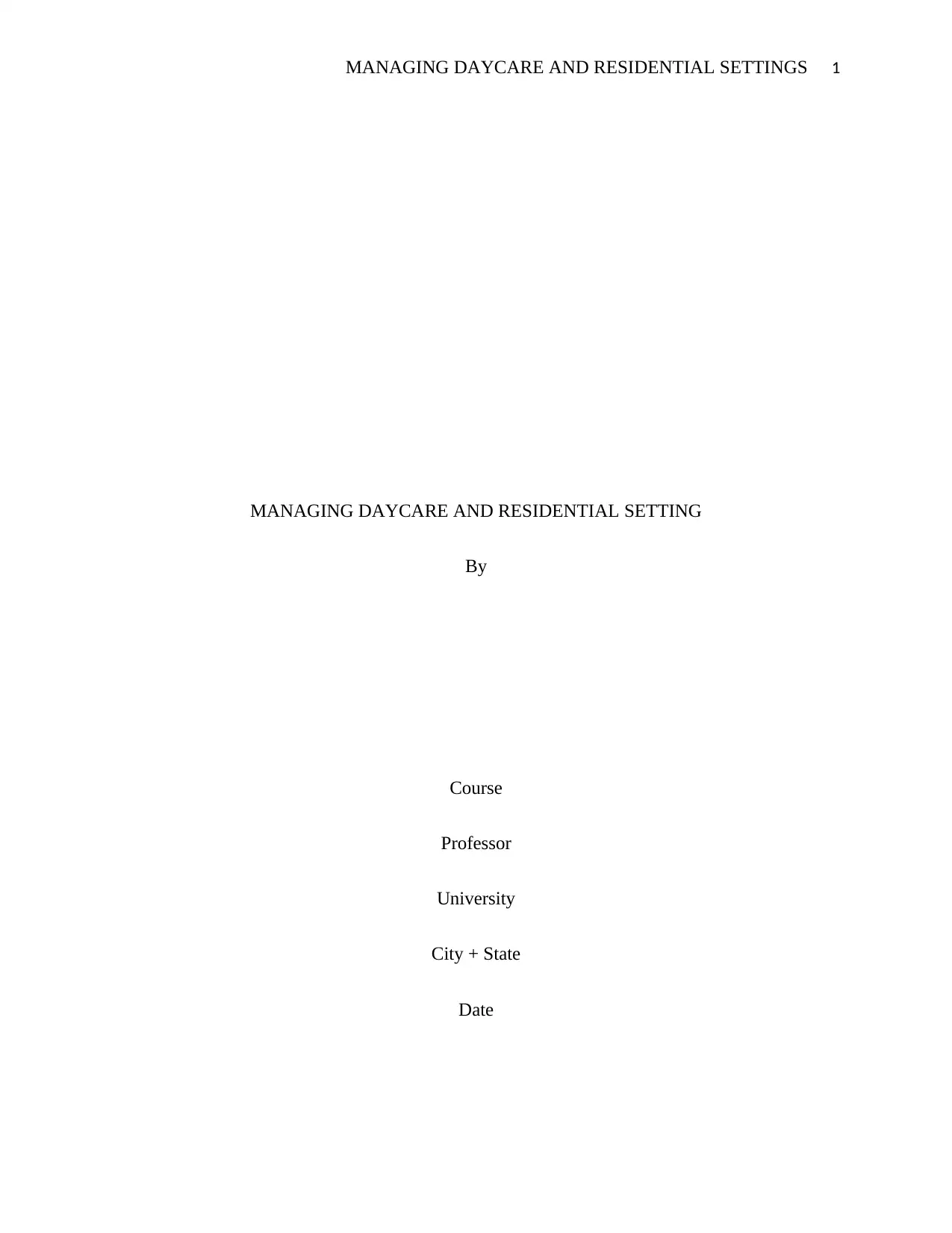
MANAGING DAYCARE AND RESIDENTIAL SETTINGS 1
MANAGING DAYCARE AND RESIDENTIAL SETTING
By
Course
Professor
University
City + State
Date
MANAGING DAYCARE AND RESIDENTIAL SETTING
By
Course
Professor
University
City + State
Date
Paraphrase This Document
Need a fresh take? Get an instant paraphrase of this document with our AI Paraphraser
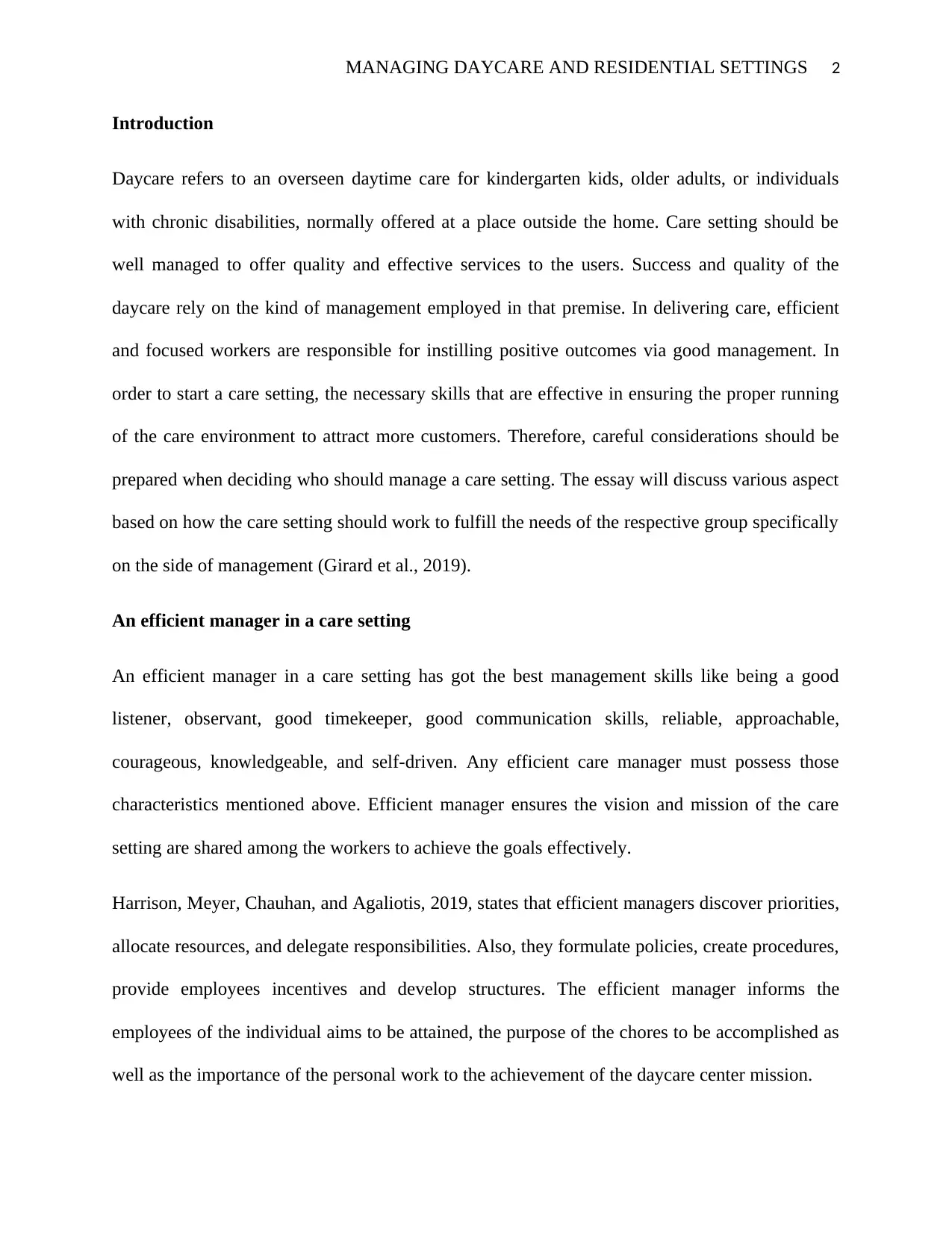
MANAGING DAYCARE AND RESIDENTIAL SETTINGS 2
Introduction
Daycare refers to an overseen daytime care for kindergarten kids, older adults, or individuals
with chronic disabilities, normally offered at a place outside the home. Care setting should be
well managed to offer quality and effective services to the users. Success and quality of the
daycare rely on the kind of management employed in that premise. In delivering care, efficient
and focused workers are responsible for instilling positive outcomes via good management. In
order to start a care setting, the necessary skills that are effective in ensuring the proper running
of the care environment to attract more customers. Therefore, careful considerations should be
prepared when deciding who should manage a care setting. The essay will discuss various aspect
based on how the care setting should work to fulfill the needs of the respective group specifically
on the side of management (Girard et al., 2019).
An efficient manager in a care setting
An efficient manager in a care setting has got the best management skills like being a good
listener, observant, good timekeeper, good communication skills, reliable, approachable,
courageous, knowledgeable, and self-driven. Any efficient care manager must possess those
characteristics mentioned above. Efficient manager ensures the vision and mission of the care
setting are shared among the workers to achieve the goals effectively.
Harrison, Meyer, Chauhan, and Agaliotis, 2019, states that efficient managers discover priorities,
allocate resources, and delegate responsibilities. Also, they formulate policies, create procedures,
provide employees incentives and develop structures. The efficient manager informs the
employees of the individual aims to be attained, the purpose of the chores to be accomplished as
well as the importance of the personal work to the achievement of the daycare center mission.
Introduction
Daycare refers to an overseen daytime care for kindergarten kids, older adults, or individuals
with chronic disabilities, normally offered at a place outside the home. Care setting should be
well managed to offer quality and effective services to the users. Success and quality of the
daycare rely on the kind of management employed in that premise. In delivering care, efficient
and focused workers are responsible for instilling positive outcomes via good management. In
order to start a care setting, the necessary skills that are effective in ensuring the proper running
of the care environment to attract more customers. Therefore, careful considerations should be
prepared when deciding who should manage a care setting. The essay will discuss various aspect
based on how the care setting should work to fulfill the needs of the respective group specifically
on the side of management (Girard et al., 2019).
An efficient manager in a care setting
An efficient manager in a care setting has got the best management skills like being a good
listener, observant, good timekeeper, good communication skills, reliable, approachable,
courageous, knowledgeable, and self-driven. Any efficient care manager must possess those
characteristics mentioned above. Efficient manager ensures the vision and mission of the care
setting are shared among the workers to achieve the goals effectively.
Harrison, Meyer, Chauhan, and Agaliotis, 2019, states that efficient managers discover priorities,
allocate resources, and delegate responsibilities. Also, they formulate policies, create procedures,
provide employees incentives and develop structures. The efficient manager informs the
employees of the individual aims to be attained, the purpose of the chores to be accomplished as
well as the importance of the personal work to the achievement of the daycare center mission.
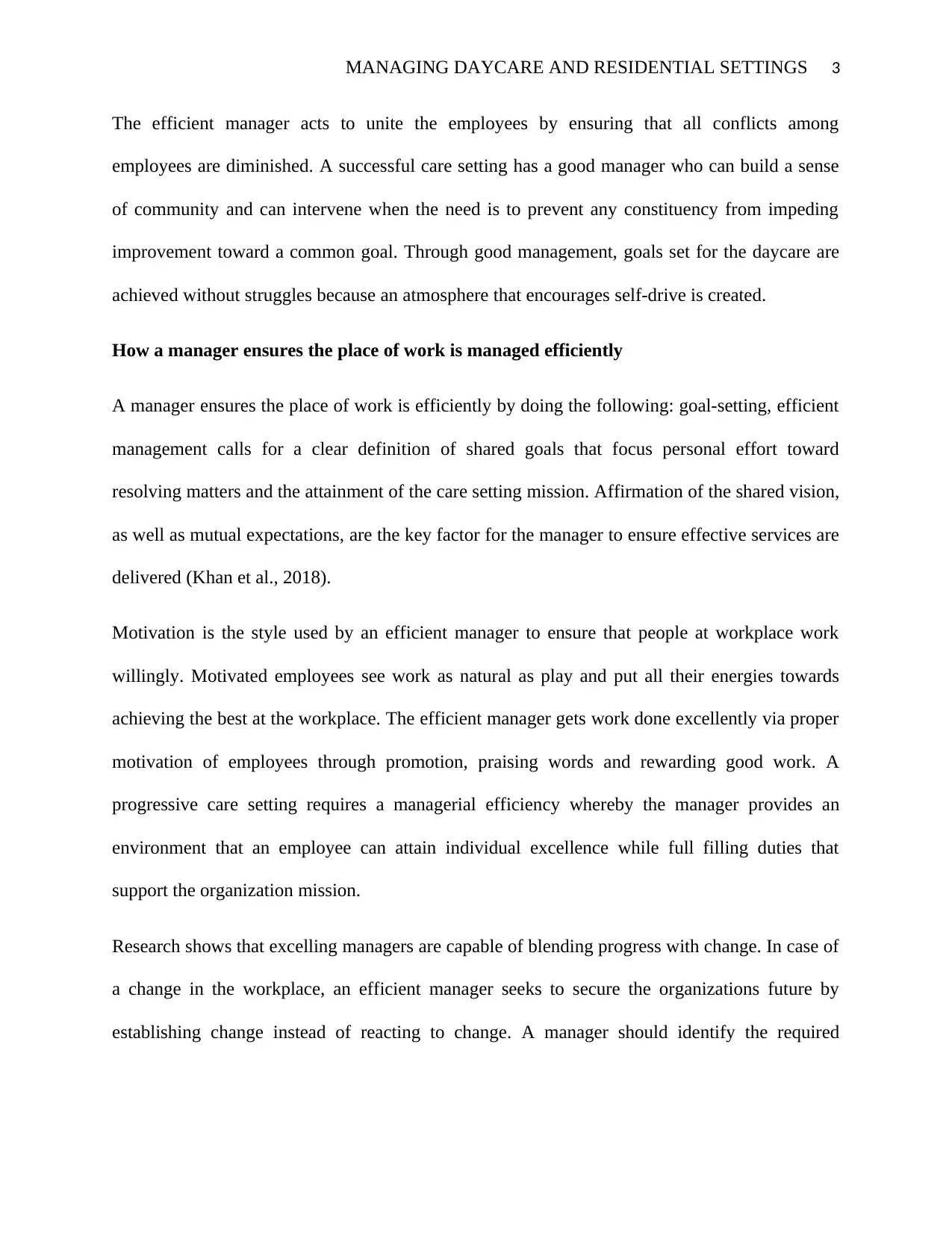
MANAGING DAYCARE AND RESIDENTIAL SETTINGS 3
The efficient manager acts to unite the employees by ensuring that all conflicts among
employees are diminished. A successful care setting has a good manager who can build a sense
of community and can intervene when the need is to prevent any constituency from impeding
improvement toward a common goal. Through good management, goals set for the daycare are
achieved without struggles because an atmosphere that encourages self-drive is created.
How a manager ensures the place of work is managed efficiently
A manager ensures the place of work is efficiently by doing the following: goal-setting, efficient
management calls for a clear definition of shared goals that focus personal effort toward
resolving matters and the attainment of the care setting mission. Affirmation of the shared vision,
as well as mutual expectations, are the key factor for the manager to ensure effective services are
delivered (Khan et al., 2018).
Motivation is the style used by an efficient manager to ensure that people at workplace work
willingly. Motivated employees see work as natural as play and put all their energies towards
achieving the best at the workplace. The efficient manager gets work done excellently via proper
motivation of employees through promotion, praising words and rewarding good work. A
progressive care setting requires a managerial efficiency whereby the manager provides an
environment that an employee can attain individual excellence while full filling duties that
support the organization mission.
Research shows that excelling managers are capable of blending progress with change. In case of
a change in the workplace, an efficient manager seeks to secure the organizations future by
establishing change instead of reacting to change. A manager should identify the required
The efficient manager acts to unite the employees by ensuring that all conflicts among
employees are diminished. A successful care setting has a good manager who can build a sense
of community and can intervene when the need is to prevent any constituency from impeding
improvement toward a common goal. Through good management, goals set for the daycare are
achieved without struggles because an atmosphere that encourages self-drive is created.
How a manager ensures the place of work is managed efficiently
A manager ensures the place of work is efficiently by doing the following: goal-setting, efficient
management calls for a clear definition of shared goals that focus personal effort toward
resolving matters and the attainment of the care setting mission. Affirmation of the shared vision,
as well as mutual expectations, are the key factor for the manager to ensure effective services are
delivered (Khan et al., 2018).
Motivation is the style used by an efficient manager to ensure that people at workplace work
willingly. Motivated employees see work as natural as play and put all their energies towards
achieving the best at the workplace. The efficient manager gets work done excellently via proper
motivation of employees through promotion, praising words and rewarding good work. A
progressive care setting requires a managerial efficiency whereby the manager provides an
environment that an employee can attain individual excellence while full filling duties that
support the organization mission.
Research shows that excelling managers are capable of blending progress with change. In case of
a change in the workplace, an efficient manager seeks to secure the organizations future by
establishing change instead of reacting to change. A manager should identify the required
⊘ This is a preview!⊘
Do you want full access?
Subscribe today to unlock all pages.

Trusted by 1+ million students worldwide
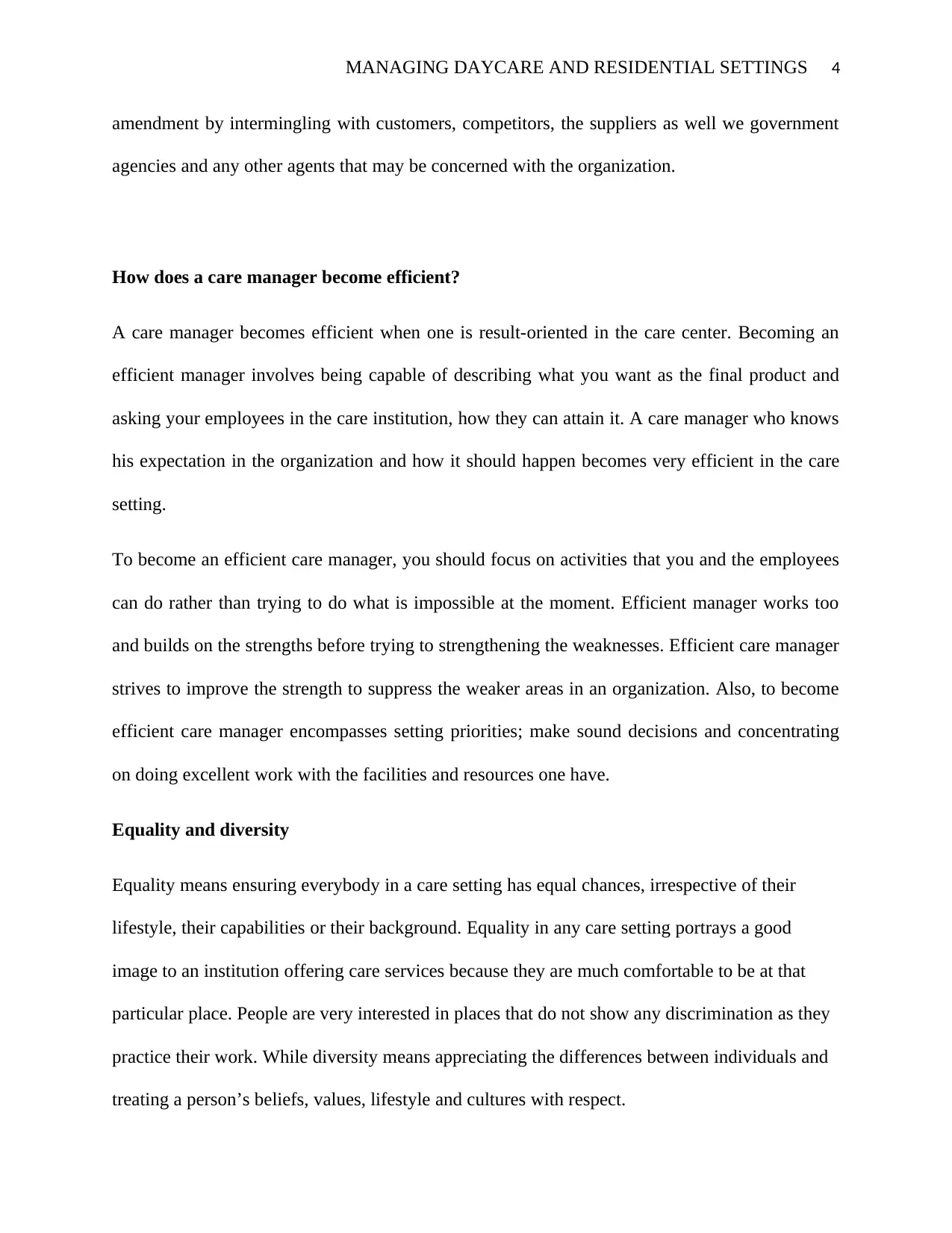
MANAGING DAYCARE AND RESIDENTIAL SETTINGS 4
amendment by intermingling with customers, competitors, the suppliers as well we government
agencies and any other agents that may be concerned with the organization.
How does a care manager become efficient?
A care manager becomes efficient when one is result-oriented in the care center. Becoming an
efficient manager involves being capable of describing what you want as the final product and
asking your employees in the care institution, how they can attain it. A care manager who knows
his expectation in the organization and how it should happen becomes very efficient in the care
setting.
To become an efficient care manager, you should focus on activities that you and the employees
can do rather than trying to do what is impossible at the moment. Efficient manager works too
and builds on the strengths before trying to strengthening the weaknesses. Efficient care manager
strives to improve the strength to suppress the weaker areas in an organization. Also, to become
efficient care manager encompasses setting priorities; make sound decisions and concentrating
on doing excellent work with the facilities and resources one have.
Equality and diversity
Equality means ensuring everybody in a care setting has equal chances, irrespective of their
lifestyle, their capabilities or their background. Equality in any care setting portrays a good
image to an institution offering care services because they are much comfortable to be at that
particular place. People are very interested in places that do not show any discrimination as they
practice their work. While diversity means appreciating the differences between individuals and
treating a person’s beliefs, values, lifestyle and cultures with respect.
amendment by intermingling with customers, competitors, the suppliers as well we government
agencies and any other agents that may be concerned with the organization.
How does a care manager become efficient?
A care manager becomes efficient when one is result-oriented in the care center. Becoming an
efficient manager involves being capable of describing what you want as the final product and
asking your employees in the care institution, how they can attain it. A care manager who knows
his expectation in the organization and how it should happen becomes very efficient in the care
setting.
To become an efficient care manager, you should focus on activities that you and the employees
can do rather than trying to do what is impossible at the moment. Efficient manager works too
and builds on the strengths before trying to strengthening the weaknesses. Efficient care manager
strives to improve the strength to suppress the weaker areas in an organization. Also, to become
efficient care manager encompasses setting priorities; make sound decisions and concentrating
on doing excellent work with the facilities and resources one have.
Equality and diversity
Equality means ensuring everybody in a care setting has equal chances, irrespective of their
lifestyle, their capabilities or their background. Equality in any care setting portrays a good
image to an institution offering care services because they are much comfortable to be at that
particular place. People are very interested in places that do not show any discrimination as they
practice their work. While diversity means appreciating the differences between individuals and
treating a person’s beliefs, values, lifestyle and cultures with respect.
Paraphrase This Document
Need a fresh take? Get an instant paraphrase of this document with our AI Paraphraser
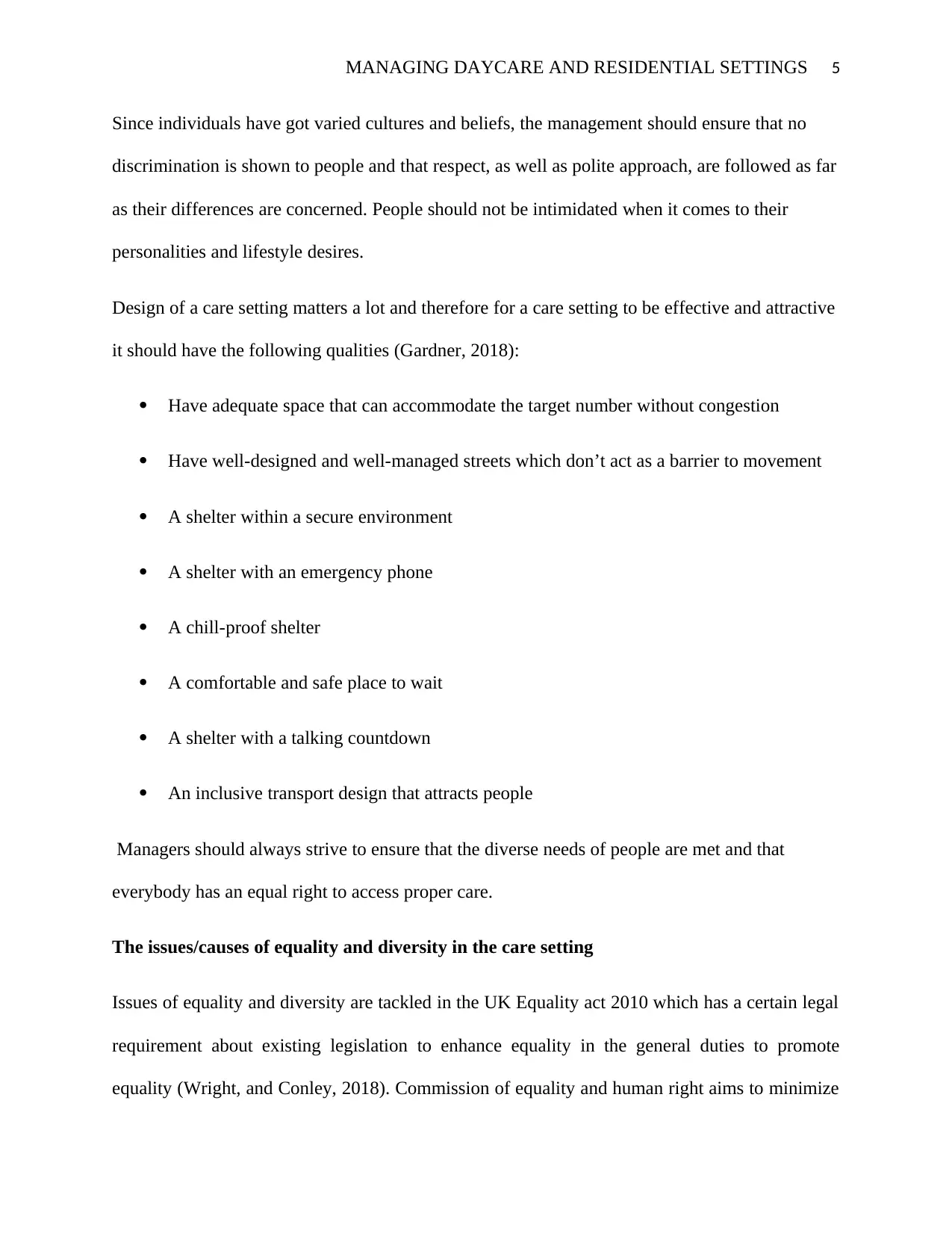
MANAGING DAYCARE AND RESIDENTIAL SETTINGS 5
Since individuals have got varied cultures and beliefs, the management should ensure that no
discrimination is shown to people and that respect, as well as polite approach, are followed as far
as their differences are concerned. People should not be intimidated when it comes to their
personalities and lifestyle desires.
Design of a care setting matters a lot and therefore for a care setting to be effective and attractive
it should have the following qualities (Gardner, 2018):
Have adequate space that can accommodate the target number without congestion
Have well-designed and well-managed streets which don’t act as a barrier to movement
A shelter within a secure environment
A shelter with an emergency phone
A chill-proof shelter
A comfortable and safe place to wait
A shelter with a talking countdown
An inclusive transport design that attracts people
Managers should always strive to ensure that the diverse needs of people are met and that
everybody has an equal right to access proper care.
The issues/causes of equality and diversity in the care setting
Issues of equality and diversity are tackled in the UK Equality act 2010 which has a certain legal
requirement about existing legislation to enhance equality in the general duties to promote
equality (Wright, and Conley, 2018). Commission of equality and human right aims to minimize
Since individuals have got varied cultures and beliefs, the management should ensure that no
discrimination is shown to people and that respect, as well as polite approach, are followed as far
as their differences are concerned. People should not be intimidated when it comes to their
personalities and lifestyle desires.
Design of a care setting matters a lot and therefore for a care setting to be effective and attractive
it should have the following qualities (Gardner, 2018):
Have adequate space that can accommodate the target number without congestion
Have well-designed and well-managed streets which don’t act as a barrier to movement
A shelter within a secure environment
A shelter with an emergency phone
A chill-proof shelter
A comfortable and safe place to wait
A shelter with a talking countdown
An inclusive transport design that attracts people
Managers should always strive to ensure that the diverse needs of people are met and that
everybody has an equal right to access proper care.
The issues/causes of equality and diversity in the care setting
Issues of equality and diversity are tackled in the UK Equality act 2010 which has a certain legal
requirement about existing legislation to enhance equality in the general duties to promote
equality (Wright, and Conley, 2018). Commission of equality and human right aims to minimize
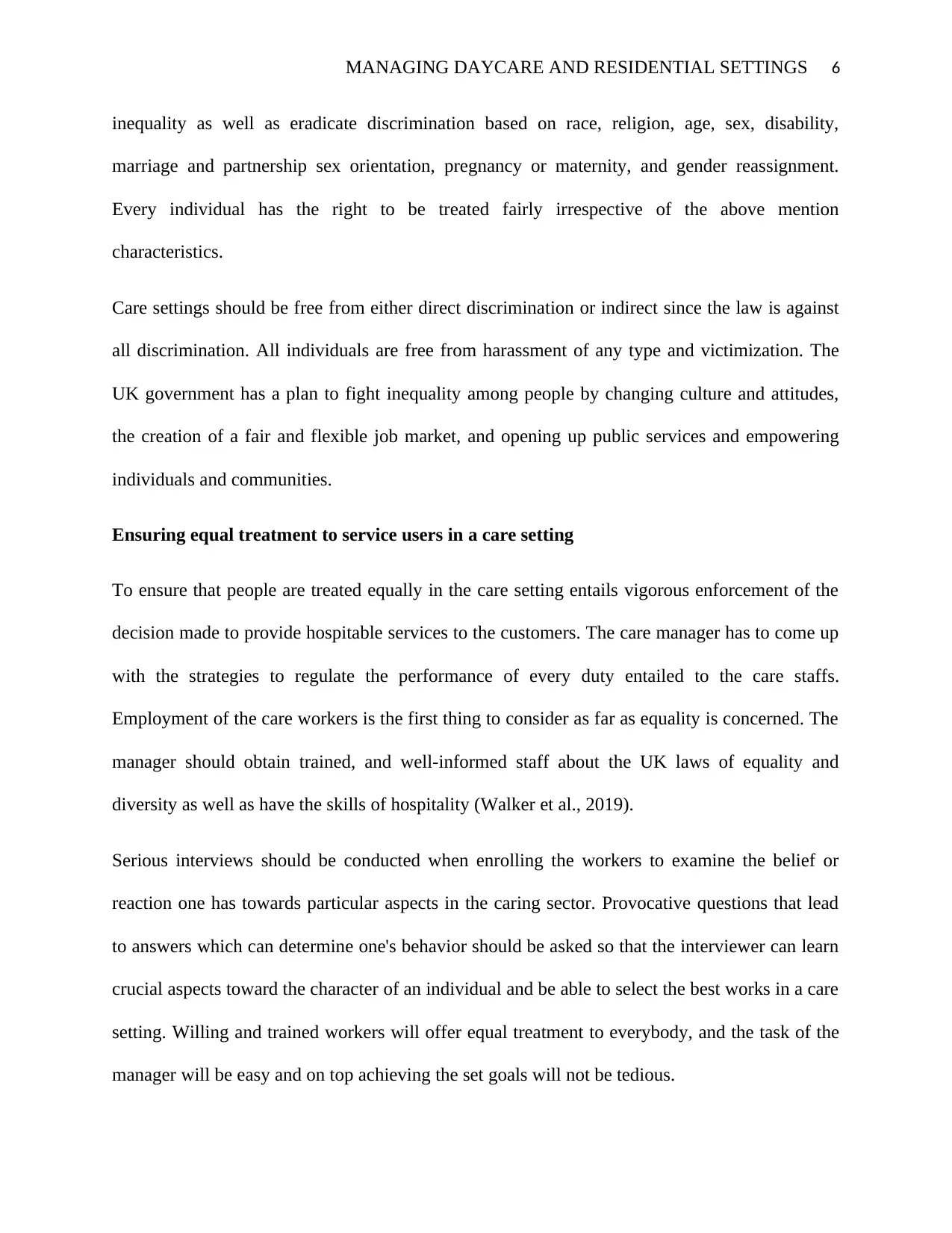
MANAGING DAYCARE AND RESIDENTIAL SETTINGS 6
inequality as well as eradicate discrimination based on race, religion, age, sex, disability,
marriage and partnership sex orientation, pregnancy or maternity, and gender reassignment.
Every individual has the right to be treated fairly irrespective of the above mention
characteristics.
Care settings should be free from either direct discrimination or indirect since the law is against
all discrimination. All individuals are free from harassment of any type and victimization. The
UK government has a plan to fight inequality among people by changing culture and attitudes,
the creation of a fair and flexible job market, and opening up public services and empowering
individuals and communities.
Ensuring equal treatment to service users in a care setting
To ensure that people are treated equally in the care setting entails vigorous enforcement of the
decision made to provide hospitable services to the customers. The care manager has to come up
with the strategies to regulate the performance of every duty entailed to the care staffs.
Employment of the care workers is the first thing to consider as far as equality is concerned. The
manager should obtain trained, and well-informed staff about the UK laws of equality and
diversity as well as have the skills of hospitality (Walker et al., 2019).
Serious interviews should be conducted when enrolling the workers to examine the belief or
reaction one has towards particular aspects in the caring sector. Provocative questions that lead
to answers which can determine one's behavior should be asked so that the interviewer can learn
crucial aspects toward the character of an individual and be able to select the best works in a care
setting. Willing and trained workers will offer equal treatment to everybody, and the task of the
manager will be easy and on top achieving the set goals will not be tedious.
inequality as well as eradicate discrimination based on race, religion, age, sex, disability,
marriage and partnership sex orientation, pregnancy or maternity, and gender reassignment.
Every individual has the right to be treated fairly irrespective of the above mention
characteristics.
Care settings should be free from either direct discrimination or indirect since the law is against
all discrimination. All individuals are free from harassment of any type and victimization. The
UK government has a plan to fight inequality among people by changing culture and attitudes,
the creation of a fair and flexible job market, and opening up public services and empowering
individuals and communities.
Ensuring equal treatment to service users in a care setting
To ensure that people are treated equally in the care setting entails vigorous enforcement of the
decision made to provide hospitable services to the customers. The care manager has to come up
with the strategies to regulate the performance of every duty entailed to the care staffs.
Employment of the care workers is the first thing to consider as far as equality is concerned. The
manager should obtain trained, and well-informed staff about the UK laws of equality and
diversity as well as have the skills of hospitality (Walker et al., 2019).
Serious interviews should be conducted when enrolling the workers to examine the belief or
reaction one has towards particular aspects in the caring sector. Provocative questions that lead
to answers which can determine one's behavior should be asked so that the interviewer can learn
crucial aspects toward the character of an individual and be able to select the best works in a care
setting. Willing and trained workers will offer equal treatment to everybody, and the task of the
manager will be easy and on top achieving the set goals will not be tedious.
⊘ This is a preview!⊘
Do you want full access?
Subscribe today to unlock all pages.

Trusted by 1+ million students worldwide
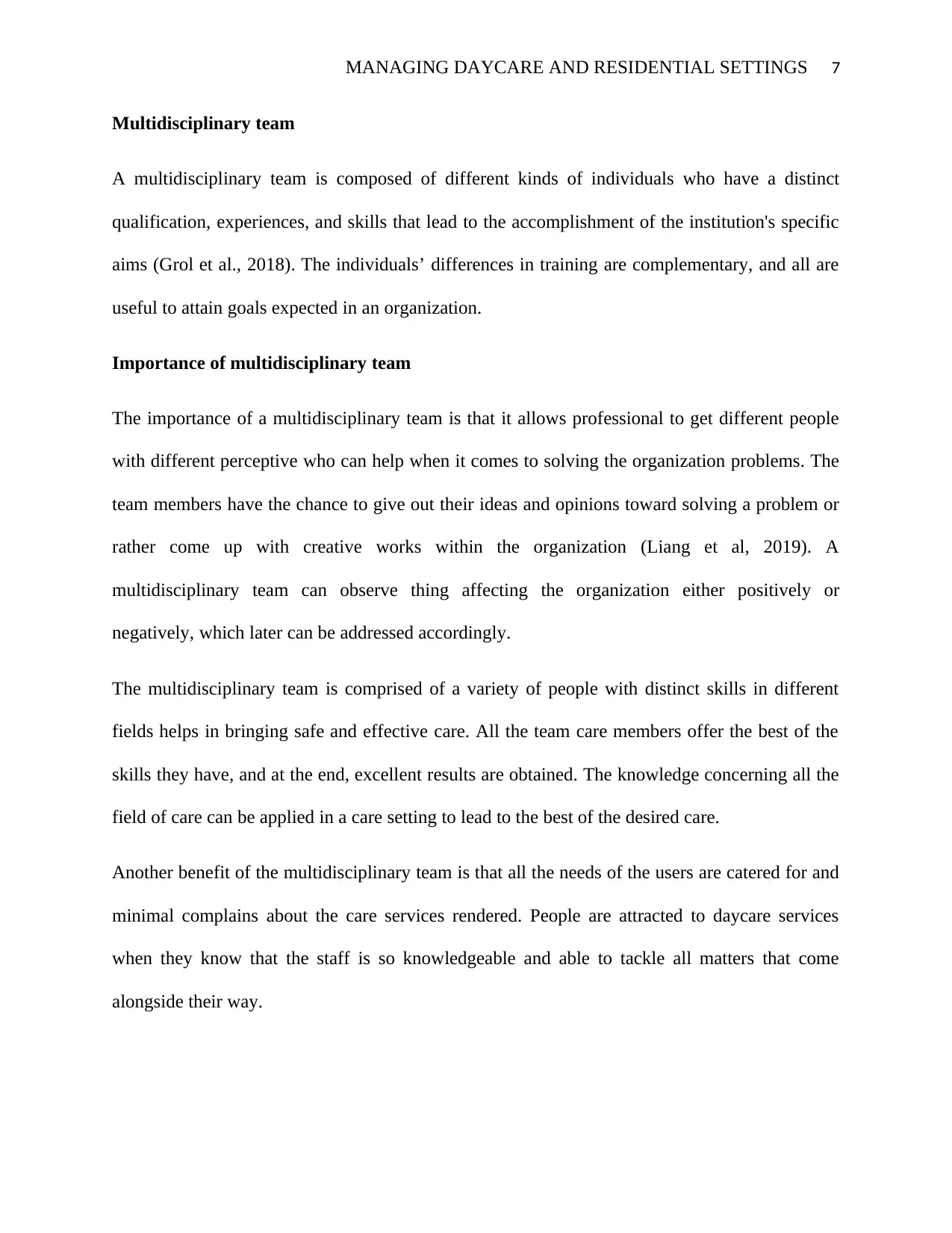
MANAGING DAYCARE AND RESIDENTIAL SETTINGS 7
Multidisciplinary team
A multidisciplinary team is composed of different kinds of individuals who have a distinct
qualification, experiences, and skills that lead to the accomplishment of the institution's specific
aims (Grol et al., 2018). The individuals’ differences in training are complementary, and all are
useful to attain goals expected in an organization.
Importance of multidisciplinary team
The importance of a multidisciplinary team is that it allows professional to get different people
with different perceptive who can help when it comes to solving the organization problems. The
team members have the chance to give out their ideas and opinions toward solving a problem or
rather come up with creative works within the organization (Liang et al, 2019). A
multidisciplinary team can observe thing affecting the organization either positively or
negatively, which later can be addressed accordingly.
The multidisciplinary team is comprised of a variety of people with distinct skills in different
fields helps in bringing safe and effective care. All the team care members offer the best of the
skills they have, and at the end, excellent results are obtained. The knowledge concerning all the
field of care can be applied in a care setting to lead to the best of the desired care.
Another benefit of the multidisciplinary team is that all the needs of the users are catered for and
minimal complains about the care services rendered. People are attracted to daycare services
when they know that the staff is so knowledgeable and able to tackle all matters that come
alongside their way.
Multidisciplinary team
A multidisciplinary team is composed of different kinds of individuals who have a distinct
qualification, experiences, and skills that lead to the accomplishment of the institution's specific
aims (Grol et al., 2018). The individuals’ differences in training are complementary, and all are
useful to attain goals expected in an organization.
Importance of multidisciplinary team
The importance of a multidisciplinary team is that it allows professional to get different people
with different perceptive who can help when it comes to solving the organization problems. The
team members have the chance to give out their ideas and opinions toward solving a problem or
rather come up with creative works within the organization (Liang et al, 2019). A
multidisciplinary team can observe thing affecting the organization either positively or
negatively, which later can be addressed accordingly.
The multidisciplinary team is comprised of a variety of people with distinct skills in different
fields helps in bringing safe and effective care. All the team care members offer the best of the
skills they have, and at the end, excellent results are obtained. The knowledge concerning all the
field of care can be applied in a care setting to lead to the best of the desired care.
Another benefit of the multidisciplinary team is that all the needs of the users are catered for and
minimal complains about the care services rendered. People are attracted to daycare services
when they know that the staff is so knowledgeable and able to tackle all matters that come
alongside their way.
Paraphrase This Document
Need a fresh take? Get an instant paraphrase of this document with our AI Paraphraser
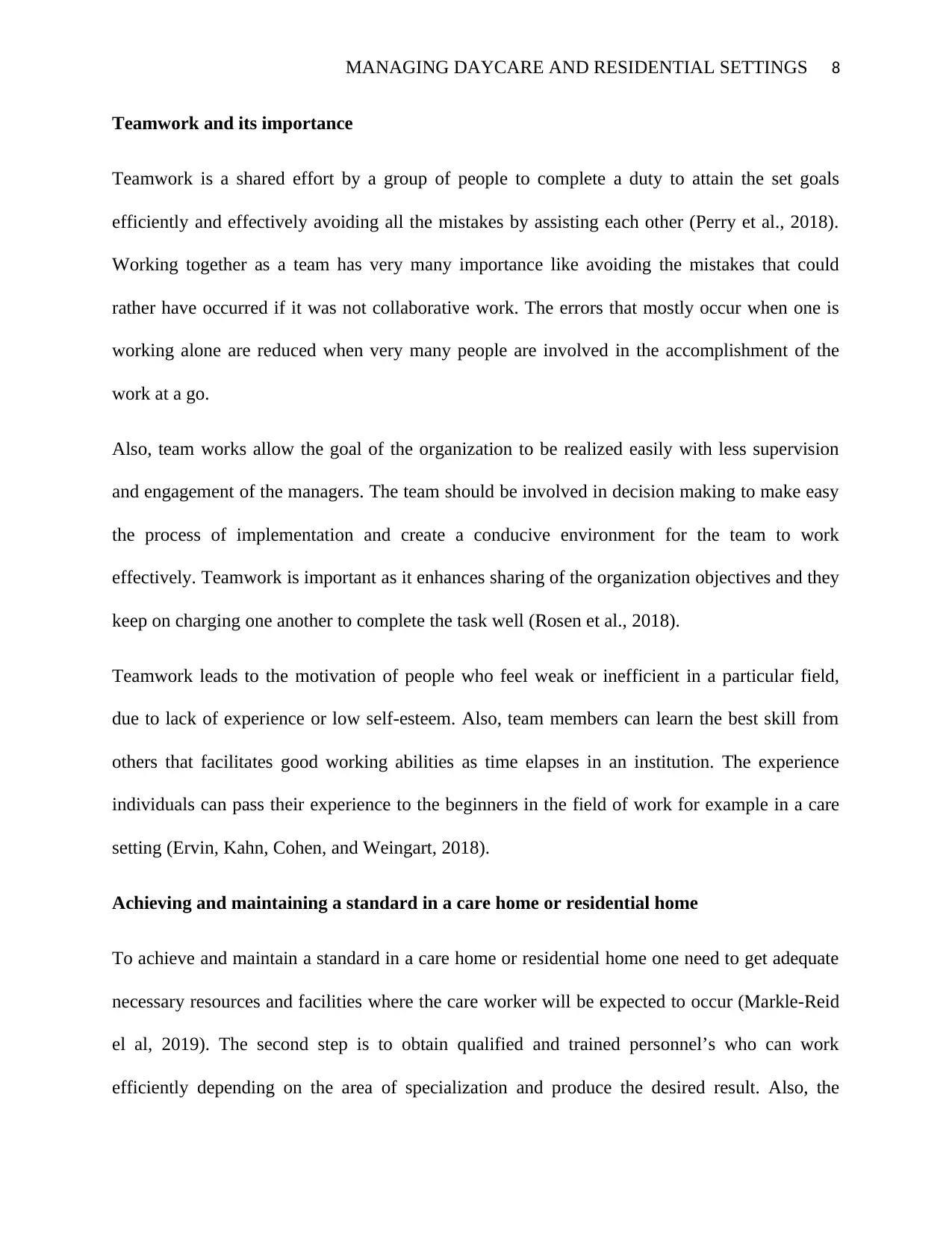
MANAGING DAYCARE AND RESIDENTIAL SETTINGS 8
Teamwork and its importance
Teamwork is a shared effort by a group of people to complete a duty to attain the set goals
efficiently and effectively avoiding all the mistakes by assisting each other (Perry et al., 2018).
Working together as a team has very many importance like avoiding the mistakes that could
rather have occurred if it was not collaborative work. The errors that mostly occur when one is
working alone are reduced when very many people are involved in the accomplishment of the
work at a go.
Also, team works allow the goal of the organization to be realized easily with less supervision
and engagement of the managers. The team should be involved in decision making to make easy
the process of implementation and create a conducive environment for the team to work
effectively. Teamwork is important as it enhances sharing of the organization objectives and they
keep on charging one another to complete the task well (Rosen et al., 2018).
Teamwork leads to the motivation of people who feel weak or inefficient in a particular field,
due to lack of experience or low self-esteem. Also, team members can learn the best skill from
others that facilitates good working abilities as time elapses in an institution. The experience
individuals can pass their experience to the beginners in the field of work for example in a care
setting (Ervin, Kahn, Cohen, and Weingart, 2018).
Achieving and maintaining a standard in a care home or residential home
To achieve and maintain a standard in a care home or residential home one need to get adequate
necessary resources and facilities where the care worker will be expected to occur (Markle-Reid
el al, 2019). The second step is to obtain qualified and trained personnel’s who can work
efficiently depending on the area of specialization and produce the desired result. Also, the
Teamwork and its importance
Teamwork is a shared effort by a group of people to complete a duty to attain the set goals
efficiently and effectively avoiding all the mistakes by assisting each other (Perry et al., 2018).
Working together as a team has very many importance like avoiding the mistakes that could
rather have occurred if it was not collaborative work. The errors that mostly occur when one is
working alone are reduced when very many people are involved in the accomplishment of the
work at a go.
Also, team works allow the goal of the organization to be realized easily with less supervision
and engagement of the managers. The team should be involved in decision making to make easy
the process of implementation and create a conducive environment for the team to work
effectively. Teamwork is important as it enhances sharing of the organization objectives and they
keep on charging one another to complete the task well (Rosen et al., 2018).
Teamwork leads to the motivation of people who feel weak or inefficient in a particular field,
due to lack of experience or low self-esteem. Also, team members can learn the best skill from
others that facilitates good working abilities as time elapses in an institution. The experience
individuals can pass their experience to the beginners in the field of work for example in a care
setting (Ervin, Kahn, Cohen, and Weingart, 2018).
Achieving and maintaining a standard in a care home or residential home
To achieve and maintain a standard in a care home or residential home one need to get adequate
necessary resources and facilities where the care worker will be expected to occur (Markle-Reid
el al, 2019). The second step is to obtain qualified and trained personnel’s who can work
efficiently depending on the area of specialization and produce the desired result. Also, the
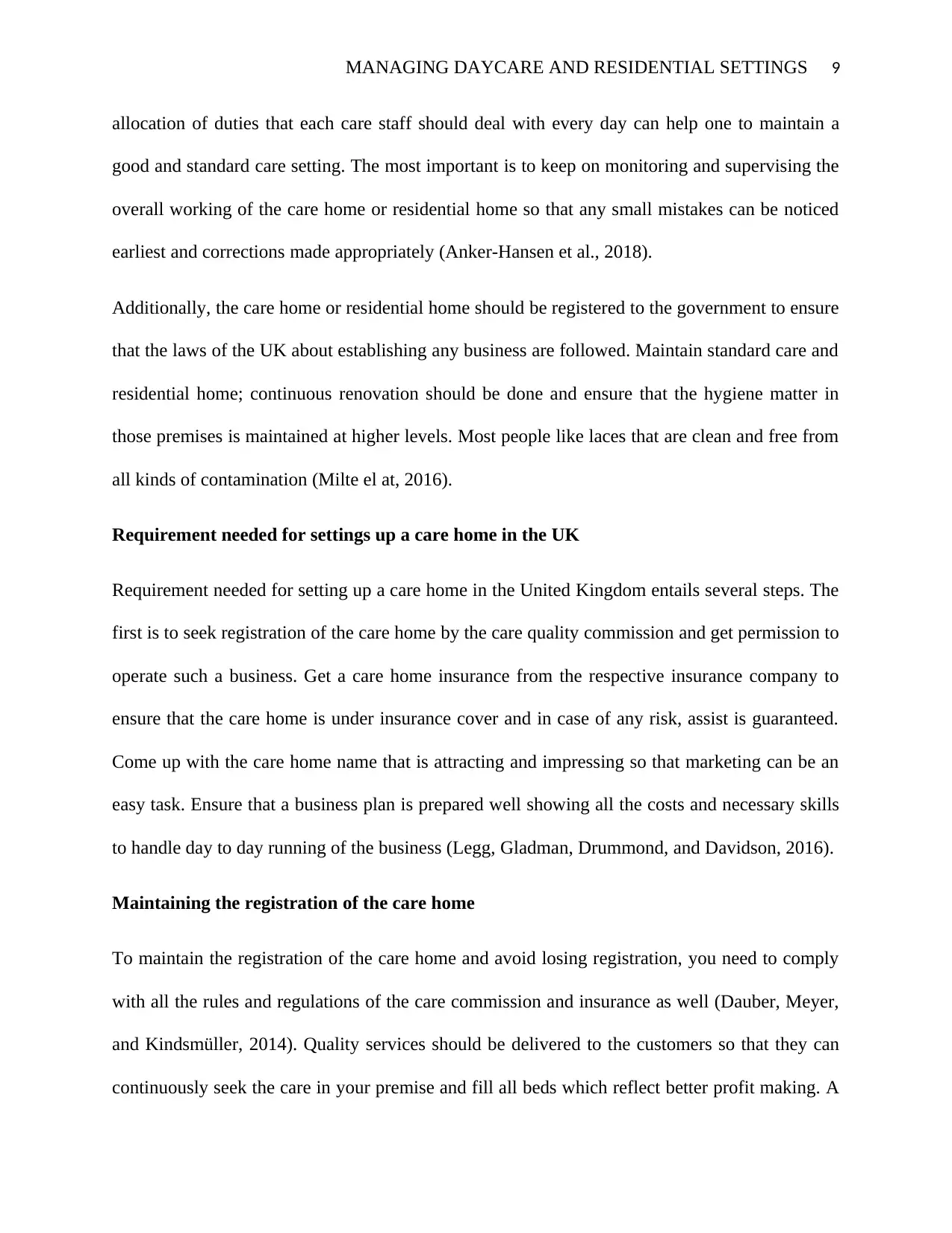
MANAGING DAYCARE AND RESIDENTIAL SETTINGS 9
allocation of duties that each care staff should deal with every day can help one to maintain a
good and standard care setting. The most important is to keep on monitoring and supervising the
overall working of the care home or residential home so that any small mistakes can be noticed
earliest and corrections made appropriately (Anker‐Hansen et al., 2018).
Additionally, the care home or residential home should be registered to the government to ensure
that the laws of the UK about establishing any business are followed. Maintain standard care and
residential home; continuous renovation should be done and ensure that the hygiene matter in
those premises is maintained at higher levels. Most people like laces that are clean and free from
all kinds of contamination (Milte el at, 2016).
Requirement needed for settings up a care home in the UK
Requirement needed for setting up a care home in the United Kingdom entails several steps. The
first is to seek registration of the care home by the care quality commission and get permission to
operate such a business. Get a care home insurance from the respective insurance company to
ensure that the care home is under insurance cover and in case of any risk, assist is guaranteed.
Come up with the care home name that is attracting and impressing so that marketing can be an
easy task. Ensure that a business plan is prepared well showing all the costs and necessary skills
to handle day to day running of the business (Legg, Gladman, Drummond, and Davidson, 2016).
Maintaining the registration of the care home
To maintain the registration of the care home and avoid losing registration, you need to comply
with all the rules and regulations of the care commission and insurance as well (Dauber, Meyer,
and Kindsmüller, 2014). Quality services should be delivered to the customers so that they can
continuously seek the care in your premise and fill all beds which reflect better profit making. A
allocation of duties that each care staff should deal with every day can help one to maintain a
good and standard care setting. The most important is to keep on monitoring and supervising the
overall working of the care home or residential home so that any small mistakes can be noticed
earliest and corrections made appropriately (Anker‐Hansen et al., 2018).
Additionally, the care home or residential home should be registered to the government to ensure
that the laws of the UK about establishing any business are followed. Maintain standard care and
residential home; continuous renovation should be done and ensure that the hygiene matter in
those premises is maintained at higher levels. Most people like laces that are clean and free from
all kinds of contamination (Milte el at, 2016).
Requirement needed for settings up a care home in the UK
Requirement needed for setting up a care home in the United Kingdom entails several steps. The
first is to seek registration of the care home by the care quality commission and get permission to
operate such a business. Get a care home insurance from the respective insurance company to
ensure that the care home is under insurance cover and in case of any risk, assist is guaranteed.
Come up with the care home name that is attracting and impressing so that marketing can be an
easy task. Ensure that a business plan is prepared well showing all the costs and necessary skills
to handle day to day running of the business (Legg, Gladman, Drummond, and Davidson, 2016).
Maintaining the registration of the care home
To maintain the registration of the care home and avoid losing registration, you need to comply
with all the rules and regulations of the care commission and insurance as well (Dauber, Meyer,
and Kindsmüller, 2014). Quality services should be delivered to the customers so that they can
continuously seek the care in your premise and fill all beds which reflect better profit making. A
⊘ This is a preview!⊘
Do you want full access?
Subscribe today to unlock all pages.

Trusted by 1+ million students worldwide
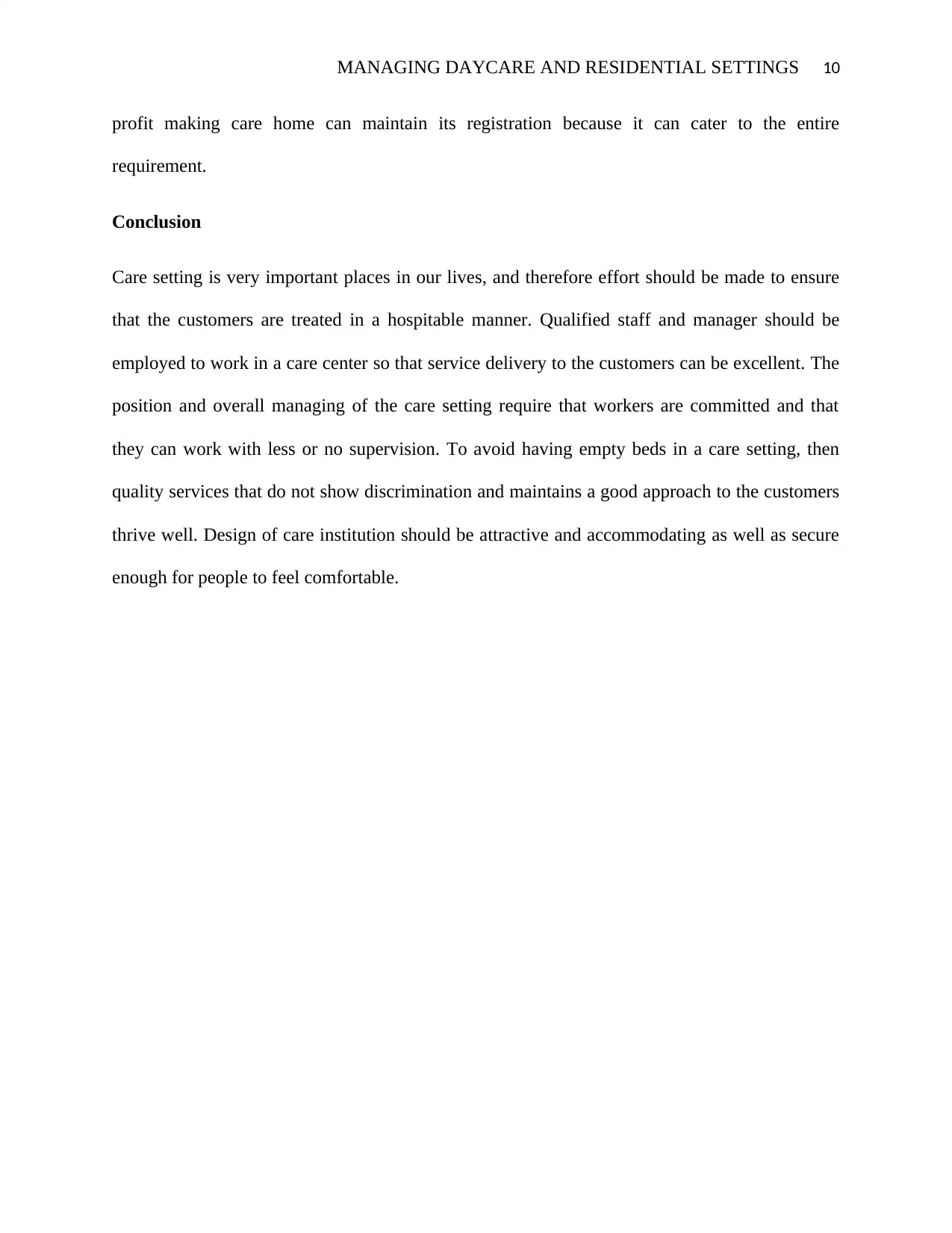
MANAGING DAYCARE AND RESIDENTIAL SETTINGS 10
profit making care home can maintain its registration because it can cater to the entire
requirement.
Conclusion
Care setting is very important places in our lives, and therefore effort should be made to ensure
that the customers are treated in a hospitable manner. Qualified staff and manager should be
employed to work in a care center so that service delivery to the customers can be excellent. The
position and overall managing of the care setting require that workers are committed and that
they can work with less or no supervision. To avoid having empty beds in a care setting, then
quality services that do not show discrimination and maintains a good approach to the customers
thrive well. Design of care institution should be attractive and accommodating as well as secure
enough for people to feel comfortable.
profit making care home can maintain its registration because it can cater to the entire
requirement.
Conclusion
Care setting is very important places in our lives, and therefore effort should be made to ensure
that the customers are treated in a hospitable manner. Qualified staff and manager should be
employed to work in a care center so that service delivery to the customers can be excellent. The
position and overall managing of the care setting require that workers are committed and that
they can work with less or no supervision. To avoid having empty beds in a care setting, then
quality services that do not show discrimination and maintains a good approach to the customers
thrive well. Design of care institution should be attractive and accommodating as well as secure
enough for people to feel comfortable.
Paraphrase This Document
Need a fresh take? Get an instant paraphrase of this document with our AI Paraphraser
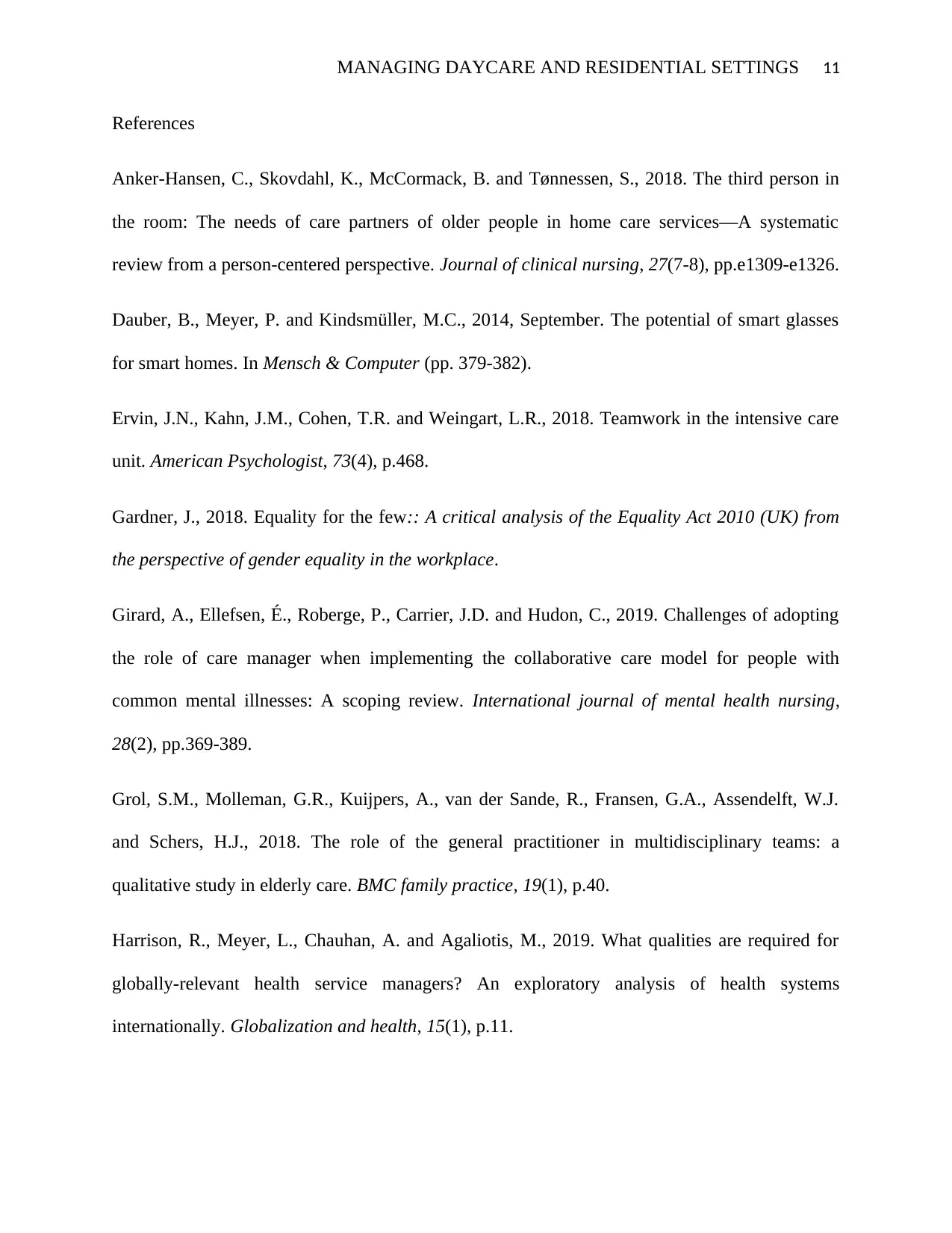
MANAGING DAYCARE AND RESIDENTIAL SETTINGS 11
References
Anker‐Hansen, C., Skovdahl, K., McCormack, B. and Tønnessen, S., 2018. The third person in
the room: The needs of care partners of older people in home care services—A systematic
review from a person-centered perspective. Journal of clinical nursing, 27(7-8), pp.e1309-e1326.
Dauber, B., Meyer, P. and Kindsmüller, M.C., 2014, September. The potential of smart glasses
for smart homes. In Mensch & Computer (pp. 379-382).
Ervin, J.N., Kahn, J.M., Cohen, T.R. and Weingart, L.R., 2018. Teamwork in the intensive care
unit. American Psychologist, 73(4), p.468.
Gardner, J., 2018. Equality for the few:: A critical analysis of the Equality Act 2010 (UK) from
the perspective of gender equality in the workplace.
Girard, A., Ellefsen, É., Roberge, P., Carrier, J.D. and Hudon, C., 2019. Challenges of adopting
the role of care manager when implementing the collaborative care model for people with
common mental illnesses: A scoping review. International journal of mental health nursing,
28(2), pp.369-389.
Grol, S.M., Molleman, G.R., Kuijpers, A., van der Sande, R., Fransen, G.A., Assendelft, W.J.
and Schers, H.J., 2018. The role of the general practitioner in multidisciplinary teams: a
qualitative study in elderly care. BMC family practice, 19(1), p.40.
Harrison, R., Meyer, L., Chauhan, A. and Agaliotis, M., 2019. What qualities are required for
globally-relevant health service managers? An exploratory analysis of health systems
internationally. Globalization and health, 15(1), p.11.
References
Anker‐Hansen, C., Skovdahl, K., McCormack, B. and Tønnessen, S., 2018. The third person in
the room: The needs of care partners of older people in home care services—A systematic
review from a person-centered perspective. Journal of clinical nursing, 27(7-8), pp.e1309-e1326.
Dauber, B., Meyer, P. and Kindsmüller, M.C., 2014, September. The potential of smart glasses
for smart homes. In Mensch & Computer (pp. 379-382).
Ervin, J.N., Kahn, J.M., Cohen, T.R. and Weingart, L.R., 2018. Teamwork in the intensive care
unit. American Psychologist, 73(4), p.468.
Gardner, J., 2018. Equality for the few:: A critical analysis of the Equality Act 2010 (UK) from
the perspective of gender equality in the workplace.
Girard, A., Ellefsen, É., Roberge, P., Carrier, J.D. and Hudon, C., 2019. Challenges of adopting
the role of care manager when implementing the collaborative care model for people with
common mental illnesses: A scoping review. International journal of mental health nursing,
28(2), pp.369-389.
Grol, S.M., Molleman, G.R., Kuijpers, A., van der Sande, R., Fransen, G.A., Assendelft, W.J.
and Schers, H.J., 2018. The role of the general practitioner in multidisciplinary teams: a
qualitative study in elderly care. BMC family practice, 19(1), p.40.
Harrison, R., Meyer, L., Chauhan, A. and Agaliotis, M., 2019. What qualities are required for
globally-relevant health service managers? An exploratory analysis of health systems
internationally. Globalization and health, 15(1), p.11.
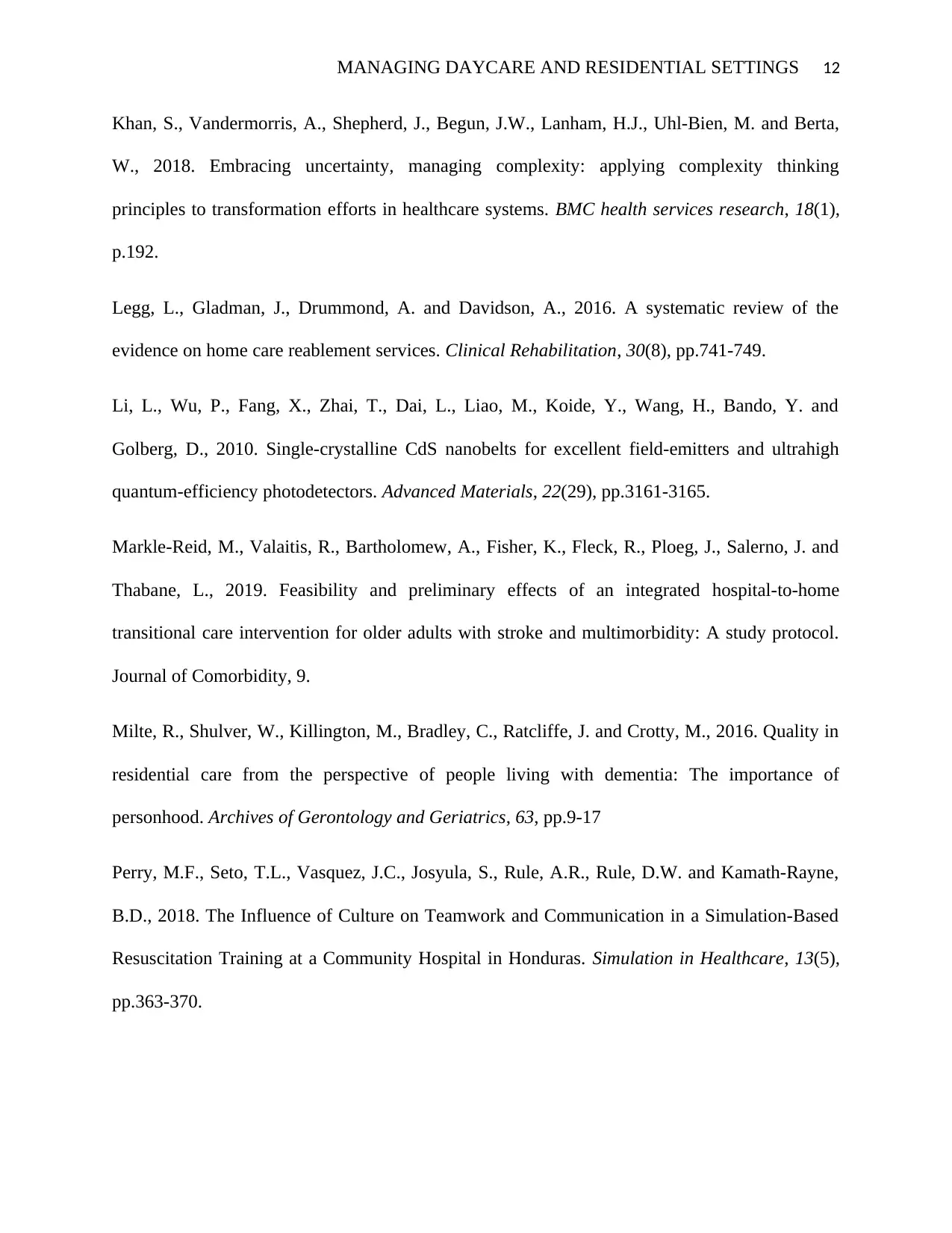
MANAGING DAYCARE AND RESIDENTIAL SETTINGS 12
Khan, S., Vandermorris, A., Shepherd, J., Begun, J.W., Lanham, H.J., Uhl-Bien, M. and Berta,
W., 2018. Embracing uncertainty, managing complexity: applying complexity thinking
principles to transformation efforts in healthcare systems. BMC health services research, 18(1),
p.192.
Legg, L., Gladman, J., Drummond, A. and Davidson, A., 2016. A systematic review of the
evidence on home care reablement services. Clinical Rehabilitation, 30(8), pp.741-749.
Li, L., Wu, P., Fang, X., Zhai, T., Dai, L., Liao, M., Koide, Y., Wang, H., Bando, Y. and
Golberg, D., 2010. Single‐crystalline CdS nanobelts for excellent field‐emitters and ultrahigh
quantum‐efficiency photodetectors. Advanced Materials, 22(29), pp.3161-3165.
Markle-Reid, M., Valaitis, R., Bartholomew, A., Fisher, K., Fleck, R., Ploeg, J., Salerno, J. and
Thabane, L., 2019. Feasibility and preliminary effects of an integrated hospital-to-home
transitional care intervention for older adults with stroke and multimorbidity: A study protocol.
Journal of Comorbidity, 9.
Milte, R., Shulver, W., Killington, M., Bradley, C., Ratcliffe, J. and Crotty, M., 2016. Quality in
residential care from the perspective of people living with dementia: The importance of
personhood. Archives of Gerontology and Geriatrics, 63, pp.9-17
Perry, M.F., Seto, T.L., Vasquez, J.C., Josyula, S., Rule, A.R., Rule, D.W. and Kamath-Rayne,
B.D., 2018. The Influence of Culture on Teamwork and Communication in a Simulation-Based
Resuscitation Training at a Community Hospital in Honduras. Simulation in Healthcare, 13(5),
pp.363-370.
Khan, S., Vandermorris, A., Shepherd, J., Begun, J.W., Lanham, H.J., Uhl-Bien, M. and Berta,
W., 2018. Embracing uncertainty, managing complexity: applying complexity thinking
principles to transformation efforts in healthcare systems. BMC health services research, 18(1),
p.192.
Legg, L., Gladman, J., Drummond, A. and Davidson, A., 2016. A systematic review of the
evidence on home care reablement services. Clinical Rehabilitation, 30(8), pp.741-749.
Li, L., Wu, P., Fang, X., Zhai, T., Dai, L., Liao, M., Koide, Y., Wang, H., Bando, Y. and
Golberg, D., 2010. Single‐crystalline CdS nanobelts for excellent field‐emitters and ultrahigh
quantum‐efficiency photodetectors. Advanced Materials, 22(29), pp.3161-3165.
Markle-Reid, M., Valaitis, R., Bartholomew, A., Fisher, K., Fleck, R., Ploeg, J., Salerno, J. and
Thabane, L., 2019. Feasibility and preliminary effects of an integrated hospital-to-home
transitional care intervention for older adults with stroke and multimorbidity: A study protocol.
Journal of Comorbidity, 9.
Milte, R., Shulver, W., Killington, M., Bradley, C., Ratcliffe, J. and Crotty, M., 2016. Quality in
residential care from the perspective of people living with dementia: The importance of
personhood. Archives of Gerontology and Geriatrics, 63, pp.9-17
Perry, M.F., Seto, T.L., Vasquez, J.C., Josyula, S., Rule, A.R., Rule, D.W. and Kamath-Rayne,
B.D., 2018. The Influence of Culture on Teamwork and Communication in a Simulation-Based
Resuscitation Training at a Community Hospital in Honduras. Simulation in Healthcare, 13(5),
pp.363-370.
⊘ This is a preview!⊘
Do you want full access?
Subscribe today to unlock all pages.

Trusted by 1+ million students worldwide
1 out of 13
Related Documents
Your All-in-One AI-Powered Toolkit for Academic Success.
+13062052269
info@desklib.com
Available 24*7 on WhatsApp / Email
![[object Object]](/_next/static/media/star-bottom.7253800d.svg)
Unlock your academic potential
Copyright © 2020–2026 A2Z Services. All Rights Reserved. Developed and managed by ZUCOL.





